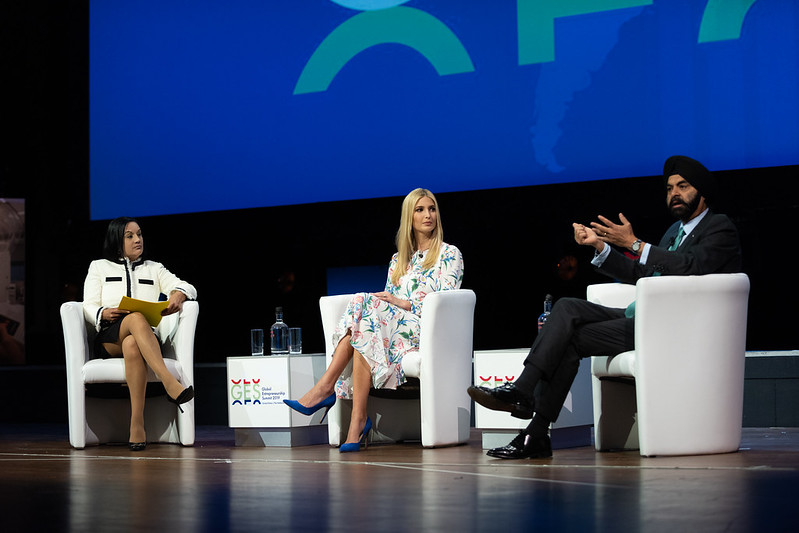
Advisor to the President of the United States of America Ivanka Trump, President and CEO of Mastercard Ajay Banga, and Acting Under Secretary of State for Economic Growth, Energy, and the Environment Manisha Singh converse during a fireside chat during the Closing Plenary Plenary Session of the 2019 Global Entrepreneurship Summit on June 5, 2019 in The Hague. (GES photo Martijn Beekman/Public Domain)
In Foreign Policy, Howard French decries the undemocratic nature of the World Bank, writing:
There are two facts that should loom above all others in thinking about the World Bank as it wraps up its almost ritualized annual meetings in Washington this weekend.
The first is that its incoming president, Ajay Banga—the 63-year-old Indian-born American and longtime executive chairman of Mastercard—was the only “candidate” for the job. Following the bank’s tradition, the United States nominated Banga, and the use of quotation marks here is meant to emphasize that there was no public debate whatsoever about who would be best suited to lead the multinational development lender, nor any open debate about priorities for the bank or leadership strategy. Banga’s experience in the credit card business is formidable, but how this prepares him for his very different new job is less than completely obvious.
This leads to the second big thing to consider about the World Bank. There is a deafening dissonance between this Western-dominated institution’s undemocratic procedures and the West’s own pronounced traditional bias in favor of democratic governance in its engagements with what was long known as the Third World. It is, of course, true that the best one can say about the West’s historic advocacy of democracy in the global south is that it has been highly inconsistent. The rub with the lack of democracy in the World Bank’s governance is about much more than this awkward hypocrisy, though.
Banga has been parachuted into his new five-year term as the bank’s leader with a ready-made agenda, which has also not been the focus of any open debate or public discussion. Led by the United States, the West has decided that climate change should be the World Bank’s overriding priority. This represents a dramatic shift that has not considered the priorities of most of its clients, who are overwhelmingly concentrated in what is euphemistically called the developing world—and which really means the scores of countries whose populations are trapped in poverty or, at best, the lower end of middle-income status. Such a dramatic shift in the bank’s agenda represents another kind of anti-democratic behavior by the institution—one that dictates that the priorities of the rich countries that fund it not only must always prevail, but are also beyond review or debate.
Read more here.
If you’re willing to fight for Main Street America, click here to sign up for the Richardcyoung.com free weekly email.




